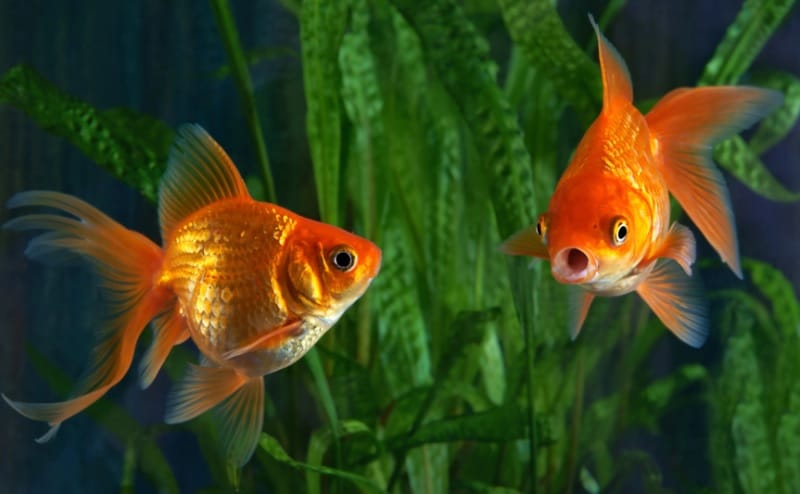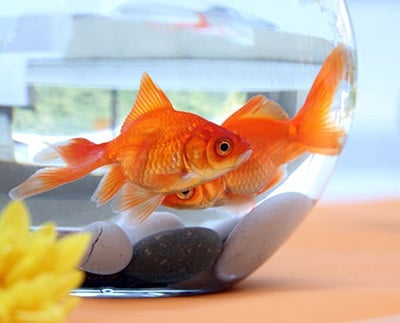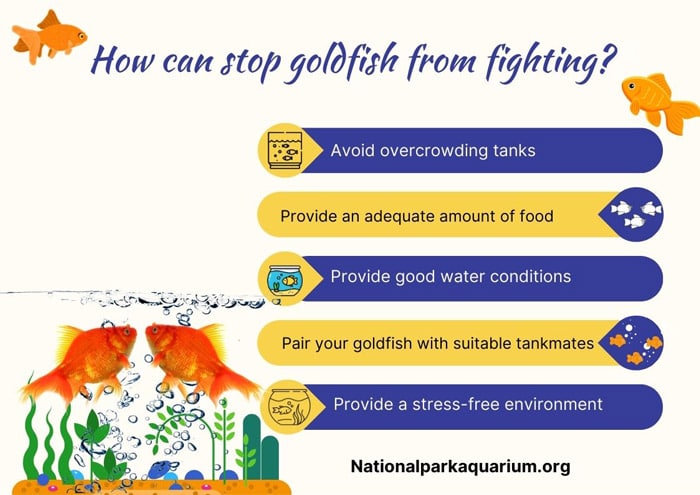Are you finding that your goldfish are constantly fighting each other? While there can be numerous reasons behind this behavior, some common explanations include competition for food, territory disputes, or simply a difference in personality.
Fortunately, there are ways to help reduce the chances of your goldfish fighting. This blog post will National Park Aquarium take a closer look at are goldfish aggressive? and what might be causing these conflicts and how you can diffuse them.
Are Goldfish Aggressive?
Goldfish are generally known for their friendly and peaceful nature. They are not considered to be aggressive and rarely show signs of being territorial. Goldfish make harmonious additions to aquariums and are calm creatures that tend to keep to themselves.
However, there can be instances where goldfish might display aggression or territoriality, which is often a result of inadequate living conditions or compatibility issues with other fish in the tank.

Why is My Goldfish Attacking My Other Goldfish?
1. Lack of space
One of the most common reasons behind goldfish fighting is a lack of space. If your fish are confined to a small area, they will likely become stressed, and this can lead to aggression.
To avoid this, provide them with a sufficiently large tank or pond with plenty of hiding places. By giving them more room to swim around, they will be less likely to become agitated and will be less likely to fight with each other.
2. Different personality types
Just like people, goldfish can have different personalities. Some fish may be more aggressive by nature and more likely to pick fights with their tank mates.
If this is the case, keeping them in a tank by themselves might be best. However, if you have two fish that seem to constantly butt heads, try placing a divider in the tank, so they have their own separate territories.
3. Competition for food
If there are not enough flakes or pellets to go around, your fish may start fighting each other to get a share of the food.
That’s why you should always provide them with sufficient food. Also, always remove any uneaten bits, so everyone gets a fair share.
4. Low water quality
Another possible explanation for why your goldfish are fighting is dirty water.
If the water in their tank is not properly filtered or cleaned, it can lead to a build-up of toxins which can make your fish stressed and more likely to fight.
Be sure to regularly clean your tank and replace the water as needed to keep it fresh and free of harmful toxins.
5. Territorially aggressive species
Some goldfish breeds are more territorial by nature and may be more prone to aggression. Common examples include fancy goldfish such as Lionheads and Orandas.
If you have one of these breeds, it is important to provide them with a large tank or pond, so they have plenty of space for themselves. You might also want to consider keeping them with other peaceful fish species that are not as territorial.
6. Sickness
If your goldfish are fighting more than usual, it could be a sign that they are sick.
Fish aggression is often a symptom of numerous diseases such as gill flukes, hole-in-the-head disease, or even stress.
If you notice your fish fighting more than usual, take them to the vet for a check-up to rule out any underlying health issues.
7. Mating season
Another possible reason for goldfish aggression is that it is mating season. During this time, fish may become more territorial and aggressive as they compete for mates.
If you notice your fish fighting more during certain times of the year, this could be the explanation. While you cannot do much to stop this behavior, it should eventually subside once the mating season is over.
8. Starting a new goldfish in the tank
If you have recently added a new goldfish to your tank, the existing fish may be feeling threatened by the newcomer.
To avoid this, it is important to introduce the new fish slowly and give them time to get used to each other. Once they have had a chance to adjust, they should be less likely to fight.
Can Goldfish Kill Each Other?

Goldfish can kill each other if they are not careful. If two goldfish are fighting and one of them gets a hold of the other’s fins, it can easily rip them off. This can lead to death for the injured goldfish.
Therefore, you should keep an eye on your goldfish and make sure they are getting along well to avoid any accidents.
How Can Stop Goldfish From Fighting?
- To isolate bullies, you can use a floating box. This can be a temporary “time-out” for the bully, and they may calm down after being released. This method is also useful during feeding time.
- If the problem persists long-term after temporary separation, consider using a tank divider.
- If cramped conditions are the root cause, consider providing your fish with more swimming space.

Conclusion
So, Goldfish are not considered to be aggressive, Goldfish fighting is a common behavior that can be caused by various factors. If your fish are constantly fighting, check for signs of stress or illness and take steps to provide them with more space.
Understanding what might be causing these conflicts can help reduce the chances of your goldfish fighting.




